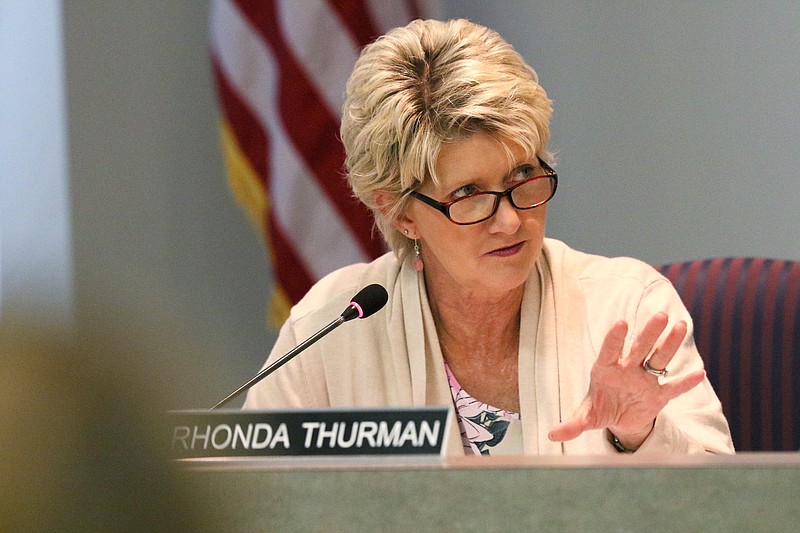Some might say it's much ado about nothing to quibble about a recent 1% raise voted for Hamilton County education personnel, but it's not the raise itself but how it happened that bothers us.
When state and local money is available, we have advocated that pay should be increased for our local district's teachers. Not only are they generally not paid well enough for what they do, but their pay needs to be competitive with that in other adjacent counties and across the line in Georgia in order to hire and retain the best teachers.
The salaries have improved relative to the other counties in recent years, but they are not where they should be. And the COVID-19 pandemic slowed that rise a year ago when raises had to be limited because of the uncertainty of state funds due to virus lockdowns.
That brings us to Feb. 15 when a proposal from the district's chief financial officer was made to Hamilton County Board of Education members during an agenda session for a 1% raise. The raise, district officials said, would be funded from $1.8 million in one-time funds from the state and $3.1 million from expected increased sales tax revenue.
The onetime money from the state was to cover the period Jan. 1-June 30, but the proposal was for re-occurring salaries.
Board members spent 13 minutes making certain they understood what was being requested since the state was not funding the 1% raise after June 30.
Ultimately, board member Jenny Hill said, "I'll [have to] study this some more."
Board member Rhonda Thurman said, "We're paying one-time money for re-occurring expenses, and I never like doing that. I'm like Jenny. I'm going to have to look at this."
Board member Steve Highlander said, "I, like these ladies, need to ponder over this a little bit."
No voted was taken.
Three days later, at the board's regular session, the proposed raise was not on the main agenda, no discussion occurred on raises, and the board ultimately voted 9-0 to blanket approve its Consent Agenda, which included among many other items the proposal for the 1% raise.
We feel sure had the raise been listed under Board Matters, as Thurman said in a letter to a local online news source that it usually is, that it would have been approved. But placing it in the Consent Agenda, especially after three members said they needed to study the issue, and not discussing it seems less than transparent.
Thurman, after the fact, said she didn't even realize what she had voted for.
"On my way home from Thursday's Board meeting," the board's longest-serving member wrote in her letter, "I made a call to ask why the raise was not on the Agenda. I was told it was. It was under the Consent Agenda."
In fairness, Thurman said in the letter, the proposal at the agenda session was listed as "FY 21 General Purpose Budget Amendment." Budget amendments, she said, are typically listed under the Consent Agenda. But raises are usually put under Board Matters, where matters have to be voted on individually, instead of as a group like items on the Consent Agenda.
"I have said many times that I would not vote to spend one-time money on re-occurring expenses," she said in the letter. "I still feel the same way. However, this one got past me. I pray we have a long-term plan to cover $3.1 million we just added to our base budget. Not just this year and next, but from now on."
Hamilton County Schools Superintendent Dr. Bryan Johnson, during the agenda session, seemed to make it clear the additional expected sales tax revenues were a given.
"We want to be as aggressive as possible [in raising salaries]," he said, "but also fiscally responsible." To suggest a 1% raise instead of a bonus from the one-time state funds, "we need to be able to fund it going forward. That's what the $3.1 million will allow us to do."
However, when board member Marco Perez wondered what would happen if the expected county revenue did not materialize as expected, Johnson seemed to suggest the 1% raise could be re-examined.
"We don't want to fund something permanent that we don't have the funds to be able to support going forward," he said.
We can't recall the school board taking back any raises it funded, though, so that eventuality remains to be seen.
Board members also will want to remember the 1% raise when it comes time for the fiscal 2022 budget and what percentage increase is granted by the state legislature for teachers.
Tennessee Gov. Bill Lee, in his State of the State address last month, proposed $342 million more for K-12 education in fiscal 2022 than is in the current budget. That would, he said, include a 4% increase in educator compensation. But local districts decide how the money will be allocated, so the recent 1% raise should be a factor.
Whatever the case, we hope all future teacher compensation is both discussed openly at regular board meetings and is never again hidden in a package that makes board members question what they'd done.
